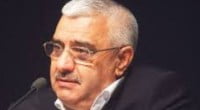Opinions

Middle East’s Struggle for Democracy: Going Beyond Headlines
Last month, when Hizmet representatives criticized the government-proposed legislation that calls for banning exam prep schools, Turkish and Western journalists labeled this opposition as a feud between Prime Minister Erdogan and Mr. Gulen because roughly 15-25 percent of these prep schools were founded by Hizmet participants according to various estimates. But that is an oversimplification.

Turkish PM Erdoğan’s rhetoric and reality
One of the main problems that Turkish and foreign interlocutors of Turkish Prime Minister Recep Tayyip Erdoğan complain of is that he employs fiery rhetoric, with a special emphasis on drama, to score points with his home base of political Islamists, a narrow minority within his popular ruling Justice and Development Party (AK Party).

Strategic defamation of Fethullah Gülen: English vs. Turkish
Dr. Koç’s review and statistical analyses show very clearly that the defamation of Gülen and the Hizmet movement is being strategically operated. Gülen is simultaneously portrayed as an Islamic danger who is secretly trying to resurrect the Ottoman Empire and caliphate (in English) and as an American and Zionist puppet who is destroying Turkey and Islam with his “moderate Islam” (in Turkish).

Discrimination by AKP government [against Hizmet movement]
Discrimination by the Justice and Development Party (AKP) government, which argues that it has addressed this issue vis-à-vis religious people, has never been analyzed. The recent row between the AKP and the Hizmet movement refers to an important and interesting fact, because it reveals this reality. In light of these discussions, bureaucrats who have been discriminated by the AKP government because of their views are now talking.

Is the Hizmet movement resisting normalization?
Accusing the Hizmet movement, which insistently demands the fulfillment of the steps towards democratization which I referred to above and contributes to the process of change as evidenced by its stance in the referendum, of serving as a parallel structure indirectly means: “I will not change myself and introduce universal reforms. You have to live with this painful fact for the normalization of the country and take your steps accordingly.”

More Divisions, More Democracy
Foreign journalists writing about Turkey like to focus on the most fundamental divide in Turkish society: the rift between religious conservatives and secularists. But these days an internal clash is raging among the conservatives themselves. And it could be a boon for Turkish democracy.

Gulen movement is of high interest to Moroccans
Morocco is among the first Arab countries where Turkish schools were established. The nation’s prominent scholars like Prof. Abbadi are closely following Fethullah Gulen, a religious scholar, who, with a civilization, individual and education-centered approach -rather than a political one- based on tolerance, offers the most effective cures for the Muslim world.

Turkish PM Erdoğan’s way worries and puzzles
Erdoğan’s political calculations for his strategy do not seem to make much sense to many. Why has he chosen to alienate the Hizmet movement now and not after the elections? Why is he even more furious with the remaining independent media than before? Is he doing all this and others to win or is this a heavy gamble, in despair, to lose or win everything?

How does PM Erdoğan hurt the liberal pious of Turkey?
Turkey has been vigorously debating the nature of its democracy and popular Prime Minister Recep Tayyip Erdoğan’s ruling style, which has increasingly authoritarian tendencies, as never before since the Gezi Park protests in May. From my perspective, the Gezi protests, on which everyone was almost forced to take sides, is a grey area since both the government and the protesters made their share of mistakes.

The real issue is the National Security Council [in Turkey]
A recent report by the Taraf daily indicating that the National Security Council (MGK) had formed a plan to destroy the Gülen movement has sparked discussions. This is only natural, considering that the current political administration is known for its adherence to religious values. This report is huge news because the government failed to oppose the military in the MGK meeting.

A little fairness, please!
Please, take a deep breath and take a trip back to a short time ago. What do you remember of the “Justice and Development Party (AK Party)-Gülen movement disagreement”? Here’s a brief reminder, for a better understanding of the discussion: Fethullah Gülen was taken to the hospital in an ambulance because of an emergency. Because I visited him that day, I wrote as follows: “One of the persons who made [the] first phone call was Prime Minister Recep Tayyip Erdoğan.

Votes of religious orders and communities [in Turkey]
The three-week debate between Prime Minister Recep Tayyip Erdoğan and Fethullah Gülen had a long past that falls under this category. Although the AK Party is powerful, the Gülen movement is not a piece of cake it can swallow easily. The AK Party is a political party that keeps its members together using the power and interests available to a ruling party. The Gülen movement, on the other hand, is an army of volunteers.

Criticism and risks
For understandable reasons, governments don’t like to be criticized. But all governments tend to make mistakes. Even if governments and administrations do not like to be criticized, criticizing their mistakes is both a right and a responsibility. It is a moral duty. The criteria for this criticism include fairness, constructiveness and the avoidance of libel and defamation. Damaging the prestige of people, groups, organizations or firms is not criticism.



















